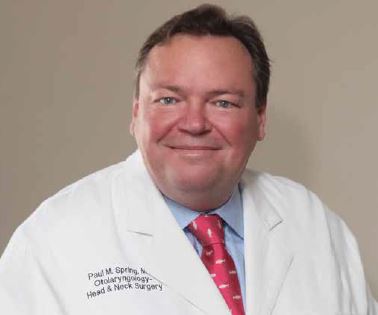Paul Spring, MD
Dr. Paul Spring treats cancers of the head and neck. He began his career with medical research that contributed to several breakthrough discoveries. Nowadays he prefers to work directly with patients, and specializes in malignancies and benign surgical conditions of the head and neck.
 Why did you choose to specialize in otolaryngology?
Why did you choose to specialize in otolaryngology?
I was already interested in the anatomy of the head and neck area and how different disease processes present in that area. But it wasn’t until medical school, when I took an elective in ENT, that I saw how diverse a specialty it was. Within that diversity, I was especially intrigued by the multidisciplinary nature of treating cancers of the head and neck. I wanted to be able to alleviate such potentially debilitating cancers and I welcomed the added challenge of post-surgical reconstruction, radiation and chemotherapy treatment. I was fascinated by how the three modalities could combine to
treat a patient.
Can you describe your background in research?
During my fellowship at MD Anderson, I discovered a gene—a serine protease inhibitor expressed in a number of oral cancers—and my colleagues and I were later able to clone it.
Later, I worked with radiation biologists to examine small-dose radiation that was, at the time, considered not to have a killing effect on the cells. However, we discovered that the low doses of radiation were actually very effective in initiating the cell-killing cascade. Thus, we determined that the same efficacy could be achieved with lower doses of radiation.
I remained very interested in radiation, and began to investigate the risk of cancer in patients with metabolic syndrome; for example, smokers or obese people with diabetes, heart disease or high cholesterol. We identified why these patients are more at risk for developing certain types of cancers, and were then able to evaluate what kind of therapeutic drugs could be taken to reduce that risk.
Please describe your most challenging surgical cases.
Those with complex pathologies in which I need to make decisions about what to remove. This happens most often with aggressive cancers of the skin, thyroid or mandible, or large sinus cancers. I enjoy the intellectual challenge of considering all available alternatives and ramifications. With these kinds of cases, it’s crucial to have a mastery of the way different tumors should be treated.
What do you like most about your job?
Being able to work with patients—to educate them, answer their questions, investigate the problem together, then bring them through surgery, radiation and chemotherapy. My most rewarding moments are when a patient comes to my office a few weeks after surgery and has had a great outcome, and later, when I get to watch that patient regain himself physically, emotionally and functionally.
How do you help patients through this process?
I want patients to feel they can ask me anything. I speak directly, I don’t minimize their problems or dumb things down and I let them know I will be there in any way possible. It’s important to realize that not all problems are 100% medical and there is a strong emotional component that must be taken into consideration.
What are some medical advances that have changed the way you practice medicine?
New treatment options greatly reduce the side effects of radiation and chemotherapy. With radiation therapy, different beams allow for better treatment of skin cancer and tumors deep below the skin’s surface.
With new chemotherapeutic agents, we are able to use small molecules that inactivate certain genes and proteins that promote cancer growth.
Genetic testing has played a huge part in better determining what drugs will be most effective in treating certain types of cancers. Now that we can identify the expression of proteins in cancerous tissues, we are able to apply a more specialized approach.
ADDRESS:
4315 Houma Blvd., Suite 401
Metairie, LA 70006
PHONE:
(504) 889-5335
RESIDENCY:
Tulane University, New Orleans, LA
FELLOWSHIP:
Head & Neck Surgery, MD Anderson Cancer Center, Houston, TX
SPECIALTIES:
Otolaryngology (Ear, Nose & Throat)
Head & Neck Surgery
PHILOSOPHY:
“Listen to patients’ concerns and process them using both medical training and compassion.”
